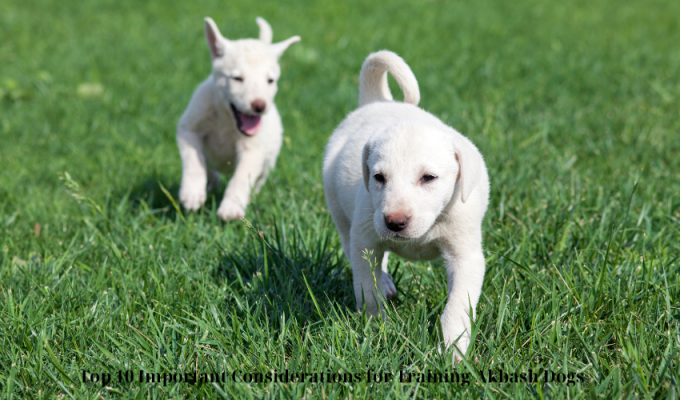Discover the essential points to keep in mind when training Akbash dogs with our top 10 important considerations. Master the art of effectively training and caring for your Akbash with these key insights.
Introduction to Akbash dogs
The Akbash is a unique and ancient breed of dog that originated in Turkey. Known for their large size and white coat, these dogs were traditionally used to guard livestock. They are independent thinkers and require specialized training and socialization to fit into a family environment. The Akbash is not your typical companion dog and requires a handler who understands their unique characteristics and can train them outside the box.
The Akbash is a breed that requires a specific approach to training and socialization. They are not well-suited for typical obedience training and require activities that encourage their independence. Additionally, they do not require a lot of exercise as adults, but they do need activities to reinforce the bond with their family. Dog puzzles are a great way to keep them occupied and engaged, as they enjoy activities that challenge their problem-solving skills. When it comes to outdoor activities, hiking can be a suitable option for Akbash dogs, but it’s important to start them off early and ensure they are comfortable with the activity.
Overall, the Akbash is a fascinating breed with unique characteristics and requirements. From specialized training to specific activities, understanding the nature of the Akbash is essential for anyone considering this breed as a companion. With the right approach and knowledge, the Akbash can make a loyal and loving addition to the family.

Characteristics of Akbash dogs:
– Large size and white coat
– Independent and requires specialized training
– Not suited for typical obedience training
– Enjoys activities that challenge their problem-solving skills
This breed requires a specific approach to training and socialization, and understanding their unique characteristics is essential for potential owners.
Understanding the unique personality and behavior traits of Akbash dogs
Akbash dogs have a distinct personality and behavior traits that set them apart from other breeds. They are independent thinkers and were bred to be guardian dogs, which means they have a strong instinct to protect and watch over their territory. This can make them wary of strangers and very loyal to their family. Their independent nature also means that they may not respond well to traditional obedience training, and they require a handler who understands their unique needs and can train them in a different way.
Personality Traits of Akbash Dogs:
– Independent: Akbash dogs are known for their independent nature and may not always seek constant attention from their owners.
– Loyal: They are fiercely loyal to their family and have a strong instinct to protect them.
– Wary of Strangers: Akbash dogs can be cautious around strangers and may take time to warm up to new people.
Behavioral Traits of Akbash Dogs:
– Guardian Instincts: Akbash dogs have a strong instinct to guard and protect their territory, whether it’s a home or a flock of livestock.
– Low Energy: As adults, Akbash dogs do not require a lot of exercise and are content to lounge around the house.
– Minimal Chasing Instinct: Unlike some other breeds, Akbash dogs are not prone to chasing after objects or animals, as their guardian instincts teach them not to give chase.
Understanding these personality and behavior traits is crucial for anyone considering bringing an Akbash dog into their home. It’s important to provide them with the right training, socialization, and activities that cater to their unique needs.
Importance of early socialization and obedience training for Akbash dogs
Early Socialization
Early socialization is crucial for Akbash dogs as it helps them to develop positive behaviors and interactions with people, other animals, and their environment. Without proper socialization, Akbash dogs may become wary or aggressive towards strangers and other animals, leading to potential behavioral issues. By exposing them to various stimuli from a young age, such as different people, places, and experiences, they can become well-adjusted and confident adult dogs.
Obedience Training
Obedience training is essential for Akbash dogs due to their independent and strong-willed nature. Traditional obedience training methods may not be effective with this breed, so it’s important to find a trainer who understands the unique characteristics of the Akbash and can tailor the training approach to suit their needs. Through obedience training, Akbash dogs can learn to follow commands, respond appropriately to different situations, and develop a strong bond with their owners.
By providing early socialization and obedience training for Akbash dogs, owners can help ensure that their pets grow up to be well-behaved, confident, and happy companions. This is especially important for a breed like the Akbash, which has specific traits and tendencies that require a specialized approach to training and socialization. With the right guidance and consistent training, Akbash dogs can become wonderful family pets and valuable members of the community.
Choosing the right training methods and techniques for Akbash dogs
Understanding the breed
Before choosing a training method for an Akbash dog, it’s important to understand the breed’s characteristics and temperament. As mentioned in the previous content, Akbash dogs are independent thinkers and may not respond well to traditional obedience training. They are also guardian dogs, which means their instincts are geared towards protecting and watching over their flock. Understanding these traits will help in selecting the most effective training methods that align with the Akbash’s natural tendencies.
Positive reinforcement
When it comes to training Akbash dogs, positive reinforcement techniques are often the most effective. This involves rewarding the dog with treats, praise, or toys when they exhibit the desired behavior. Since Akbash dogs are known to be independent, using positive reinforcement can help motivate them to follow commands and engage in training activities. It’s important to find treats or rewards that are highly appealing to the Akbash in order to maintain their interest and cooperation during training sessions.
Consistency and patience
Consistency is key when training Akbash dogs. Due to their independent nature, it may take time for them to fully grasp and respond to training commands. It’s essential for handlers to be patient and persistent, providing clear and consistent cues to the dog. Additionally, incorporating regular training sessions into the Akbash’s routine can help reinforce the desired behaviors over time. It’s important to approach training with a calm and patient demeanor, as these dogs may not respond well to harsh or forceful training methods.
By understanding the breed, utilizing positive reinforcement, and maintaining consistency and patience, handlers can choose effective training methods and techniques that cater to the unique characteristics of Akbash dogs.
Addressing potential challenges and problems during training
Understanding the breed
When training an Akbash, it is important to understand the breed’s natural instincts and characteristics. As mentioned in the previous content, the Akbash is a guardian dog that was bred to be independent and to think for itself. This can pose a challenge when it comes to traditional obedience training methods, as the Akbash may not respond well to commands in the same way that other breeds do. It is important for handlers to be patient and to find alternative training approaches that align with the breed’s instincts and behavior.
Socialization and consistency
Socialization is crucial for the Akbash breed, especially from a young age. Without proper socialization, they may become wary or even aggressive towards strangers and other animals. Consistency in training and socialization is key, as the Akbash must learn to differentiate between potential threats and normal interactions. Handlers should expose the Akbash to various environments, people, and animals in a controlled and positive manner to ensure that they become well-adjusted and confident dogs.
Training methods and activities
Since traditional obedience training may not be the most effective approach for the Akbash, handlers should explore alternative training methods and activities that cater to the breed’s independent nature. This may include puzzle toys, trick training, and activities that engage the Akbash’s mind and instincts. It is important to find activities that the Akbash enjoys and that reinforce the bond between the dog and its family. Additionally, understanding the breed’s energy levels and preferences for activities, such as hiking, can help in creating a training regimen that is both effective and enjoyable for the Akbash.
Maintaining consistency and patience in training Akbash dogs
Maintaining consistency and patience in training Akbash dogs is crucial due to their independent and strong-willed nature. These dogs were bred to think for themselves and do not respond well to traditional obedience training methods. Therefore, it is important for handlers to understand the breed and be patient when training them. Consistency in training methods, commands, and expectations is key to successfully training an Akbash. Handlers should be prepared to take a different approach to training and find activities that will engage and motivate the Akbash.
Key Points for Consistent Training
– Use positive reinforcement: Reward good behavior with treats, praise, and affection to motivate the Akbash to continue learning and obeying commands.
– Be patient: Akbash dogs may take longer to learn commands and may not respond immediately. Patience is essential to avoid frustration and maintain a positive training environment.
– Establish clear rules and boundaries: Consistency in enforcing rules and boundaries will help the Akbash understand what is expected of them and prevent confusion during training.
– Practice regular socialization: Exposing the Akbash to different people, animals, and environments from a young age will help them become well-adjusted and less wary of strangers.
Overall, maintaining consistency and patience in training Akbash dogs requires a deep understanding of the breed’s unique characteristics and a commitment to positive, reward-based training methods. Handlers should be prepared to invest time and effort into training and socializing their Akbash to ensure they become well-behaved and well-adjusted companions.
Ensuring proper exercise and mental stimulation for Akbash dogs during training
Exercise
Proper exercise is essential for the physical and mental well-being of Akbash dogs. While they may not require a lot of exercise as adults, it is important to start them on a routine of regular walks and hikes from a young age. This will help them stay fit and maintain a healthy weight. Additionally, engaging in activities such as hiking, walking, and even swimming can help strengthen the bond between the dog and their owner. It is important to ensure that the exercise is done in mild to moderate weather to prevent any health issues related to extreme temperatures.
Mental Stimulation
Akbash dogs are independent thinkers and require mental stimulation to keep them engaged and prevent boredom. Dog puzzles are a great way to encourage their independence and keep them occupied. These puzzles come in varying levels of difficulty and can be easily purchased or made at home. It is important to include tasty treats in the puzzles to motivate the dog to solve them. Trick training is another way to provide mental stimulation for Akbash dogs. Teaching them tricks such as picking up their toys or bringing you the paper can help keep their minds active and engaged.
In conclusion, ensuring proper exercise and mental stimulation for Akbash dogs is crucial for their overall well-being. By incorporating regular exercise routines and engaging in activities that provide mental stimulation, owners can help their Akbash dogs stay healthy, happy, and well-behaved. Remember to always be consistent and patient when training and exercising Akbash dogs, and to keep their specific breed traits in mind when planning activities.
In conclusion, training Akbash dogs requires a patient and consistent approach. It’s important to understand their independent nature and provide positive reinforcement. Socialization, proper exercise, and clear boundaries are key to raising a well-behaved Akbash.

